
Last week, I had the privilege of speaking at the World Pride Human Rights Conference in Washington DC. As I stood before a diverse audience of academics, activists, lawyers and policymakers, I was struck by how much the world has changed since my last appearance at this event in 2023, when it was held in Sydney.
Back then, the mood was jubilant. The Sydney conference culminated with the Harbour Bridge being closed to traffic, so that 50,000 LGBTIQA+ people and allies could march across it, in a dazzling sea of rainbows.
Prime Minister Anthony Albanese and Minister for Foreign Affairs Wong led the way, symbolising the progress that’ss been made in recognising and protecting the rights of LGBTIQA+ people in Australia.
At the end of the Sydney event, the baton was passed to the US to host the 2025 conference, with an overwhelming sense of optimism that the momentum for equality would continue to build.
If only we had had a crystal ball! No one foresaw the dramatic changes that would unfold for LGBTIQA+ people – particularly trans and gender-diverse individuals – in the United States and beyond.

This year in Washington DC, my speech was far more sombre. The optimism I felt in Sydney was tempered by a stark new reality – progress is fragile, and rights that once seemed secure can be rolled back with alarming speed.
The proximity of the conference to the White House was a poignant reminder that political winds can change direction quickly, and that those changes have real, often devastating, consequences for people’s lives.
Unfortunately, what happens in Washington does not stay in Washington. The relentless campaign against trans rights in the US has emboldened bigots worldwide, with an alarming surge in anti-LGBTIQA+ rhetoric, and legislation targeting trans and gender-diverse individuals.
Ghana exemplifies how discriminatory regimes and anti-trans politics leverage off each other to justify the violations of people’s rights. Draft legislation in Ghana threatens to ban trans healthcare, dissolve LGBTQ+ organisations, and even mandate conversion therapy.
Under this bill, simply identifying as trans could result in a prison sentence of up to three years, while those who support trans groups could face five to 10 years behind bars. Samuel George, the bill’s lead proponent, cited recent US developments as supporting Ghana’s draconian measures.
"My life is at stake"
Gay Ghanaians fear for their fate with the passing of the new bill that imposes prison sentences for anyone identifying as LGBTQ+. pic.twitter.com/Y0711h747Y— BBC News Africa (@BBCAfrica) February 28, 2024
Meanwhile in parts of Europe, we’re seeing the pursuit of anti-trans initiatives that come straight from the Trump playbook.
In Hungary, Prime Minister Viktor Orbán has enacted a series of laws and constitutional amendments specifically designed to erase transgender identities from public life and to curtail the rights of all LGBTQ+ people. Trump has praised Orbán, describing him as “one of the strongest leaders anywhere in the world … he runs [Hungary] tough, he runs it properly, he runs it strong”.
Similarly, in Poland, the recently-elected President, Karol Nawrocki, is aligned with the conservative Law and Justice party, which was responsible for the introduction of “LGBT-free zones” in more than 100 municipalities across Poland between 2019-23.
Nawrocki was invited to the White House and endorsed by Trump prior to the election. As president, he has the power to veto laws and a platform to stoke anti-LGBTIQA+ hate.
And in the UK, the Supreme Court has interpreted the outdated Equality Act to mean that the term “women” in that act does not include trans women. The decision is deeply flawed, yet the government has so far failed to step up and say it will remedy this problem by amending the Equality Act 2010, to make it fit-for-purpose in 2025 and beyond.
These developments in the US, UK and elsewhere are why I made the difficult decision to travel to the United States and speak at the 2025 World Pride Human Rights Conference. And I completely understand and empathise with the LGBTIQA+ Australians who made the equally difficult decision to not attend World Pride this year.
As someone who has been researching LGBTIQA+ advocacy strategies, how to effectively use international human rights law, and how to successfully engage with UN mechanisms, I was keen to share the latest knowledge about strategies for combatting hostile domestic governments.

I spoke about how the global south has used “boomerang advocacy” to apply external pressure on authoritarian governments in an effort to effect positive change locally. It may be time for NGOs in the global north to consider implementing such strategies, as their governments become increasingly hostile to respecting the rights of LGBTIQA+ citizens.
I came away from this World Pride Human Rights Conference with the realisation that the LGBTIQA+ community has a superpower – solidarity. An attack on one is an attack on all.
The bonds of solidarity that connect LGBTIQA+ people across borders and cultures are stronger than any law or policy designed to erase us. And while many LGBTIQA+ people could not attend World Pride this year, because of where it was being held, those who were present spoke loud and proud for the entire global community.
Read more: How video games can unlock euphoria for transgender players
The message that echoed through every session was clear and unwavering: Equality is not negotiable, it’s a fundamental human right that belongs to everyone, regardless of their sexual orientation or gender identity.
Although we’re seeing a tsunami of laws eroding equality, we’re also witnessing enormous resistance and resilience. Creative strategies are being developed to ensure the United Nations and international human rights law – born in the aftermath of World War II – live up to their purpose of protecting the rights of all peoples.
At the World Pride Human Rights conference, alliances were forged across borders to amplify the voices of the targeted minorities and to hold governments to account, and to ensure that the UN and other global bodies respond forcefully to efforts to roll back hard-fought-for human rights.
As I left Washington DC, I was reminded that we cannot afford to be complacent, but neither should we lose hope.
When people unite and refuse to be silenced, change is possible. History shows us that progress is rarely linear – there are setbacks, but there are also moments of extraordinary courage and solidarity that propel us forward. World Pride 2025 was one of those moments.





